IVF success rate has improved by 60 per cent

HYDERABAD: An estimated 1.9 crore couples in India suffer from sub-clinical or lifetime infertility in reproductive age group of 25–49 years. This large number requires artificial assistance in reproduction, whose success rate has seen a marked improvement of 60 percent; experts have observed on eve of the World IVF Day on Sunday.
Infertility in urban areas is rising mainly due to lifestyle issues, changing food habits and sedentary lifestyle. In rural India, it is being attributed to pesticides and large use of chemicals.
Hidden fertility has been noted in 30 per cent men, whose semen characteristics make conception largely difficult. This rebuts the stigma of infertility being mostly attributed to women. Within the medical community itself, they have found that a large number of men are having problems.
A survey of reports from 1,750 IVF centres in India has shown that smoking, stress, prolonged sitting and sedentary lifestyle are affecting men’s re-productivity.
Androcare Andrology Institute andrologist Dr Rahul Reddy said, "There is a wrong notion that one sperm is enough for fertilisation. That is not the case. A healthy sperm and healthy egg are required for success of IVF procedures. Correcting of sperms and eggs takes at least two to six months. Many couples are unwilling to wait for this period. Only those couples who take proper treatment before IVF procedures have successful outcomes," Dr. Rahul Reddy observed.
City IVF experts say due to family pressures, deficiencies in men are not discussed and couples are thus counselled separately.
Dr Nirmala Agrawal, core fertility specialist at Juhi Fertility Centre, said, "There are multiple reasons for failed IVFs. But that does not mean that another attempt cannot be made. Learning from mistakes of the first attempt can help ensure good quality egg and sperm. Also involved are technical issues related to quality of the lab and transfer of embryos. These rectifications make it possible to have a successful IVF procedure," she underlined.
There has been a marked improvement in IVF procedures with good laboratories and technological interventions helping rectification of errors in initial stages of treatment. Further, a skilled physician and embryologist can go a long way in improving IVF outcomes.
Dr Agrawal said, "We have come across couples who had been depressed after failed IVF attempts. But they must not give up, as mistakes can be rectified and their dream for parenthood still achieved."
Experts state that it is the team effort between andrologist, IVF specialist, embryologist and patient couple that has helped achieve much better results. There are many couples who had given up. But subsequently, the women could bear a child via IVF procedures.
A significant aspect in all this is while the first child is via an IVF procedure, the second child is result of natural pregnancy. Slight rectification in lifestyle, diet and dealing with stress has helped reproductive systems rejuvenate.
Governor Dr Tamilisai Soundararajajan in a virtual conference asked the Indian Society for Assisted Reproduction to make IVF procedures accessible and affordable so that needy couples can opt for it. Chief guest in a virtual session of India IVF summit, Dr Soundararajan said, "Couples should be able to utilise the advances of technology and for that reason it must be affordable to them. Promote scientific based medical treatment to treat infertility."

